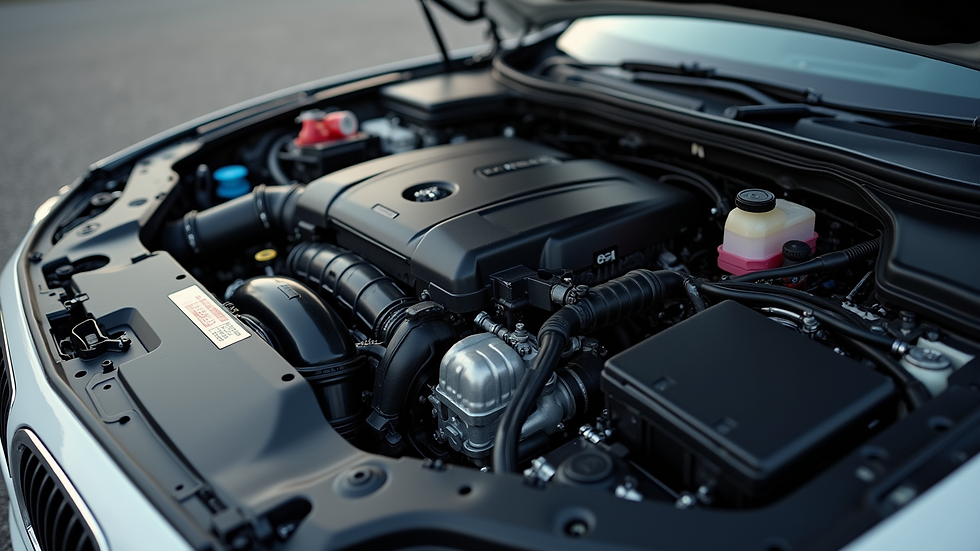Signs Your Vehicle May Need an Engine Performance Check
- Sprinter City Expert

- Aug 18, 2025
- 3 min read
Updated: Sep 13, 2025
When your vehicle starts acting up, it can be difficult to know exactly what’s wrong. One common issue that many drivers face is a decline in engine performance. Recognizing the signs early can save you from costly repairs and keep your vehicle running smoothly. This article will guide you through the key indicators that your vehicle may need an engine performance check using engine diagnostics.
Common Signs Indicating You Need Engine Diagnostics
Your vehicle’s engine is a complex system, and when something goes wrong, it often shows clear signs. Here are some common symptoms that suggest it’s time to get your engine checked:
Reduced Fuel Efficiency: If you notice that you’re filling up your gas tank more often than usual, it could mean your engine is not running efficiently.
Engine Misfires or Rough Idling: When your engine stutters or shakes while idling, it may indicate problems with the spark plugs, fuel system, or air intake.
Loss of Power: Difficulty accelerating or a sluggish response when pressing the gas pedal can signal engine trouble.
Check Engine Light: This warning light is your vehicle’s way of telling you something is wrong. Ignoring it can lead to more serious damage.
Unusual Noises: Knocking, pinging, or tapping sounds coming from the engine area should never be ignored.

Why Engine Diagnostics Are Essential for Your Vehicle
Engine diagnostics help identify the root cause of engine problems quickly and accurately. Modern vehicles are equipped with onboard computers that monitor engine performance and store error codes when something goes wrong. A diagnostic tool can read these codes and provide valuable information to mechanics.
Using engine diagnostics allows for:
Accurate Problem Identification: Instead of guessing, mechanics can pinpoint the exact issue.
Time and Cost Savings: Early detection prevents minor issues from becoming major repairs.
Improved Vehicle Performance: Fixing engine problems restores power, fuel efficiency, and smooth operation.
Safety Assurance: Ensuring your engine runs properly reduces the risk of breakdowns or accidents.

What are engine performance diagnostics?
Engine performance diagnostics involve a series of tests and scans to evaluate how well your engine is functioning. This process includes checking various components such as the fuel system, ignition system, sensors, and exhaust emissions.
During diagnostics, a technician will:
Connect a diagnostic scanner to the vehicle’s onboard computer.
Retrieve error codes that indicate specific engine issues.
Perform physical inspections of engine parts.
Test fuel pressure, spark plugs, and air filters.
Analyze exhaust emissions to ensure compliance with environmental standards.
This comprehensive approach helps identify problems that may not be obvious during a simple visual inspection. After diagnostics, the mechanic can recommend the necessary repairs or maintenance to restore optimal engine performance.
How to Maintain Your Engine’s Performance Between Checks
Preventive care is key to avoiding frequent engine problems. Here are some practical tips to keep your engine running smoothly:
Regular Oil Changes: Fresh oil lubricates engine parts and prevents wear.
Replace Air Filters: Clean air filters improve fuel efficiency and engine power.
Use Quality Fuel: High-quality gasoline reduces deposits and engine knocking.
Check Spark Plugs: Worn spark plugs can cause misfires and poor acceleration.
Monitor Fluid Levels: Keep coolant, transmission fluid, and brake fluid at recommended levels.
Drive Smoothly: Avoid rapid acceleration and heavy braking to reduce engine strain.
Following these steps can extend the time between engine performance checks and reduce the likelihood of unexpected issues.

When to Seek Professional Engine Performance Diagnostics
If you notice persistent symptoms like those mentioned earlier, it’s important to act promptly. Delaying a professional engine performance check can lead to:
Increased fuel consumption
Engine damage requiring expensive repairs
Reduced vehicle reliability and safety
A certified mechanic can perform engine performance diagnostics using advanced tools to provide a detailed assessment. They will offer solutions tailored to your vehicle’s needs, whether it’s a simple tune-up or more extensive repairs.
Taking Care of Your Vehicle’s Heart
Your engine is the heart of your vehicle. Paying attention to the signs of trouble and acting quickly can save you time, money, and stress. By understanding when to seek engine diagnostics and how to maintain your engine, you can enjoy a smoother, safer driving experience for years to come. Don’t wait for a breakdown - keep your engine performance in check and drive with confidence.


Comments